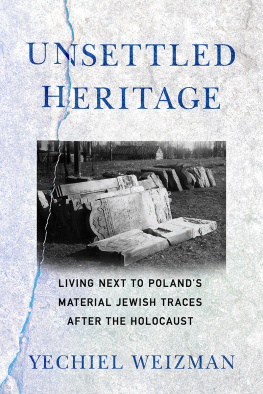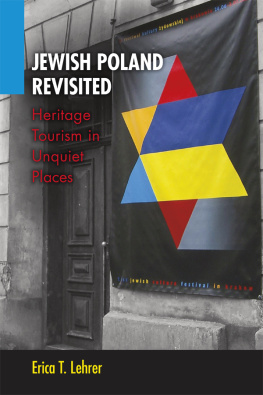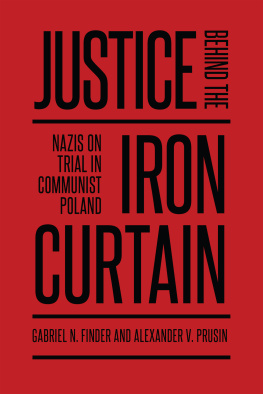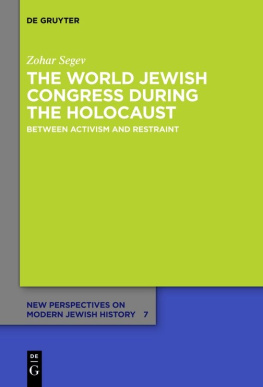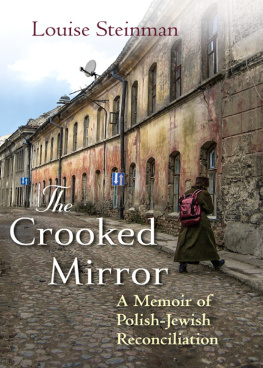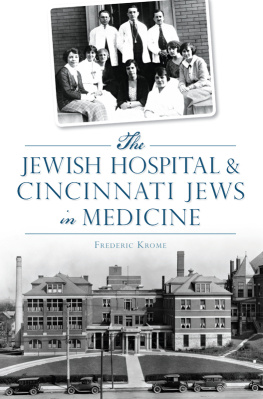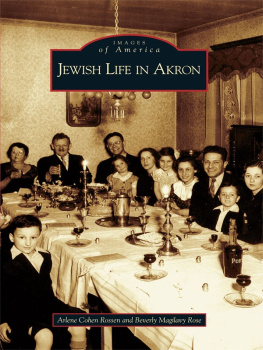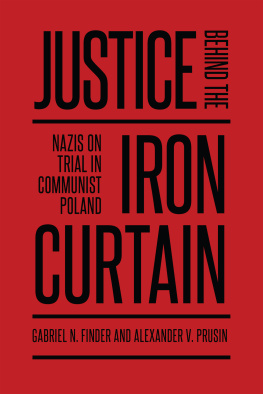Yechiel Weizman - Unsettled Heritage: Living next to Polands Material Jewish Traces after the Holocaust
Here you can read online Yechiel Weizman - Unsettled Heritage: Living next to Polands Material Jewish Traces after the Holocaust full text of the book (entire story) in english for free. Download pdf and epub, get meaning, cover and reviews about this ebook. City: Ithaca, year: 2022, publisher: Cornell University Press, genre: History. Description of the work, (preface) as well as reviews are available. Best literature library LitArk.com created for fans of good reading and offers a wide selection of genres:
Romance novel
Science fiction
Adventure
Detective
Science
History
Home and family
Prose
Art
Politics
Computer
Non-fiction
Religion
Business
Children
Humor
Choose a favorite category and find really read worthwhile books. Enjoy immersion in the world of imagination, feel the emotions of the characters or learn something new for yourself, make an fascinating discovery.
- Book:Unsettled Heritage: Living next to Polands Material Jewish Traces after the Holocaust
- Author:
- Publisher:Cornell University Press
- Genre:
- Year:2022
- City:Ithaca
- Rating:5 / 5
- Favourites:Add to favourites
- Your mark:
Unsettled Heritage: Living next to Polands Material Jewish Traces after the Holocaust: summary, description and annotation
We offer to read an annotation, description, summary or preface (depends on what the author of the book "Unsettled Heritage: Living next to Polands Material Jewish Traces after the Holocaust" wrote himself). If you haven't found the necessary information about the book — write in the comments, we will try to find it.
InUnsettled Heritage, Yechiel Weizman explores what happened to the thousands of abandoned Jewish cemeteries and places of worship that remained in Poland after the Holocaust, asking how postwar society in small, provincial towns perceived, experienced, and interacted with the physical traces of former Jewish neighbors.
After the war, with few if any Jews remaining, numerous deserted graveyards and dilapidated synagogues became mute witnesses to the Jewish tragedy, leaving Poles with the complicated task of contending with these ruins and deciding on their future upkeep. Combining archival research into hitherto unexamined sources, anthropological field work, and cultural and linguistic analysis, Weizman uncovers the concrete and symbolic fate of sacral Jewish sites in Polands provincial towns, from the end of the Second World War until the fall of the communist regime. His book weaves a complex tale whose main protagonists are the municipal officials, local activists, and ordinary Polish citizens who lived alongside the material reminders of their murdered fellow nationals.
Unsettled Heritage shows the extent to which debating the status and future of the material Jewish remains was never a neutral undertaking for Polesnor was interacting with their disturbing and haunting presence. Indeed, it became one of the most urgent municipal concerns of the communist era, and the main vehicle through which Polish society was confronted with the memory of the Jews and their annihilation.
Yechiel Weizman: author's other books
Who wrote Unsettled Heritage: Living next to Polands Material Jewish Traces after the Holocaust? Find out the surname, the name of the author of the book and a list of all author's works by series.

